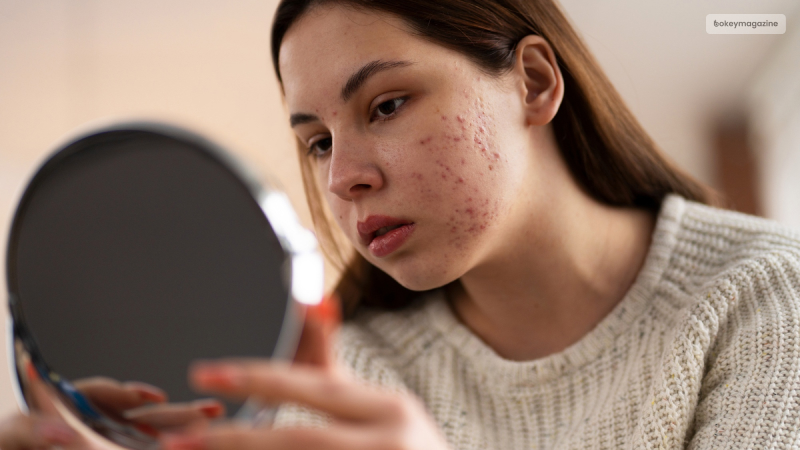
Is Niacinamide Good for Acne? Is It Okay to Use Niacinamide for Acne Skin?
Acne is a frustrating skin condition that affects millions of people worldwide. It’s caused by a complex interplay of factors, including excess oil production, clogged pores, bacteria, and inflammation. Hormonal changes, stress, and certain medications can all contribute to the development of acne. Understanding the root causes of your acne is the first step in finding an effective solution.
Acne can manifest in various forms, from blackheads and whiteheads to painful cystic breakouts. It can be particularly stubborn and persistent, leaving many people self-conscious and searching for a reliable solution. That’s where niacinamide, a powerhouse ingredient, may come into play.
What is Niacinamide?
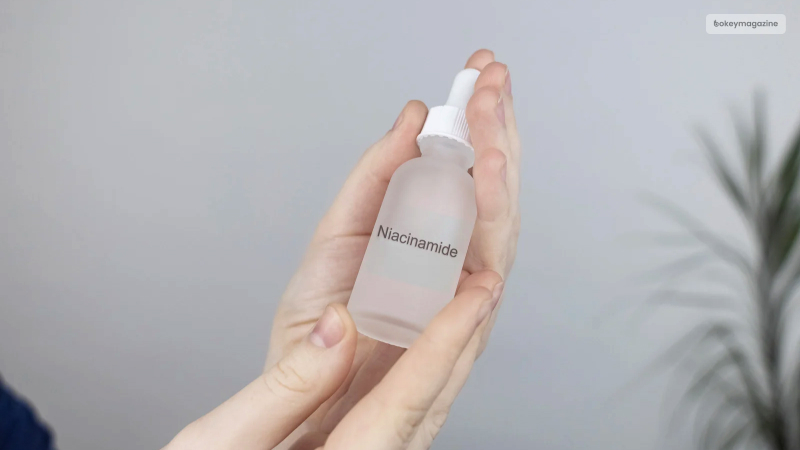
Niacinamide, also known as vitamin B3, is a water-soluble vitamin that has gained significant attention in skincare. It’s a versatile ingredient that can address many skin concerns, including acne, hyperpigmentation, and signs of aging.
Niacinamide regulates the production of sebum, the natural oil our skin produces. It also has anti-inflammatory properties, which can help reduce the redness and swelling associated with acne. Additionally, niacinamide can help improve the skin’s barrier function, making it more resilient and less susceptible to irritation.
How Does Niacinamide Help with Acne?
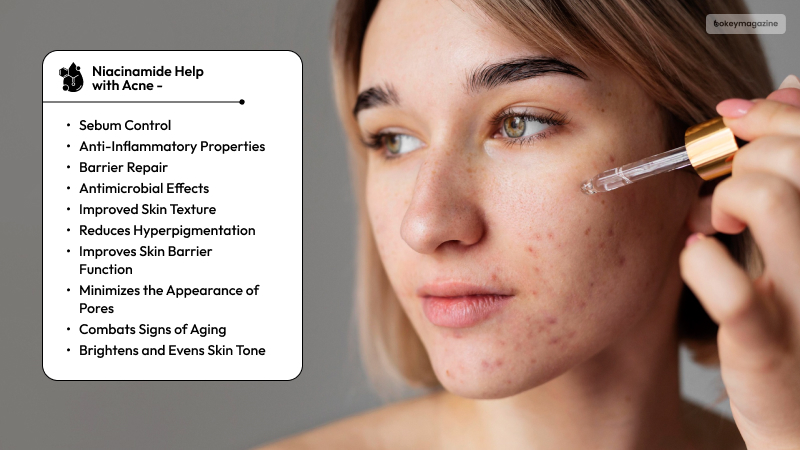
Niacinamide’s multi-faceted approach to addressing acne makes it a potential game-changer. Here’s a closer look at how it can help:
- Sebum Control: Niacinamide helps regulate sebum production, which can clog pores and lead to breakouts. By controlling excess oil, niacinamide can prevent the formation of new acne lesions.
- Anti-Inflammatory Properties: Niacinamide has been shown to have potent anti-inflammatory effects, which can help reduce the redness, swelling, and irritation associated with acne.
- Barrier Repair: Niacinamide can strengthen the skin’s natural barrier, making it more resilient and less susceptible to environmental stressors that can exacerbate acne.
- Antimicrobial Effects: Some studies suggest that niacinamide may have mild antimicrobial properties, which can help manage the bacterial overgrowth contributing to acne.
- Improved Skin Texture: By addressing multiple aspects of acne, niacinamide can help improve the overall texture and appearance of the skin, reducing the visible signs of breakouts.
- Reduces Hyperpigmentation: Niacinamide can help fade dark spots, discoloration, and other forms of hyperpigmentation, leaving your skin even-toned.
- Improves Skin Barrier Function: By strengthening the skin’s natural barrier, niacinamide can help prevent moisture loss and protect against environmental stressors.
- Minimizes the Appearance of Pores: Niacinamide can help regulate sebum production and refine the appearance of enlarged pores.
- Combats Signs of Aging: Niacinamide has been shown to improve the appearance of fine lines, wrinkles, and other age-related concerns.
- Brightens and Evens Skin Tone: Niacinamide can help achieve a more radiant, even complexion by addressing various skin concerns.
Potential Side Effects of Using Niacinamide for Acne
While niacinamide is generally well-tolerated, it’s important to be aware of potential side effects. Some people may experience:
- Mild flushing or tingling sensation upon initial use
- Dryness or irritation, especially if using high concentrations or in combination with other acne treatments
- Allergic reactions, though these are relatively rare
To minimize the risk of side effects, it’s recommended to start with a lower concentration of niacinamide (around 2-5%) and gradually increase the strength if your skin tolerates it well. It’s also essential to patch-test any new product before incorporating it into your routine.
How To Incorporate Niacinamide into Your Skincare Routine?
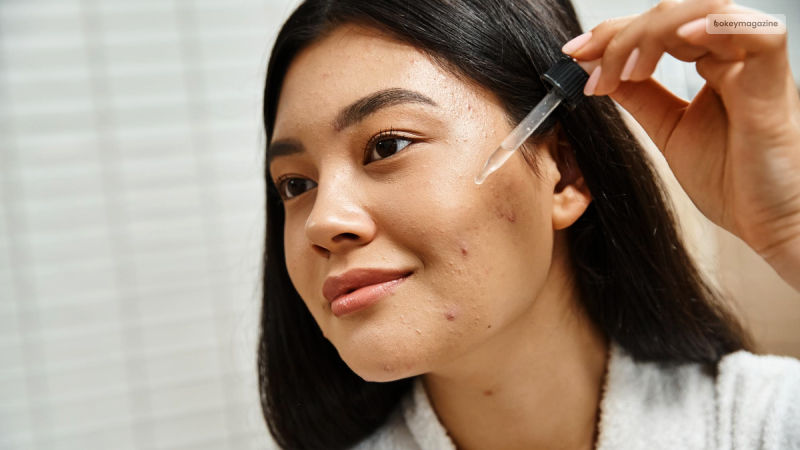
Integrating niacinamide into your skincare routine for acne-prone skin can be a game-changer. Here are some tips to help you get started:
- Choose the Right Niacinamide Product: Look for serums, moisturizers, or treatments containing 2-5% niacinamide. Avoid products with high concentrations, as they may be more likely to cause irritation.
- Start Slowly: Use your niacinamide product 1-2 times per week, gradually increasing the frequency as your skin adjusts.
- Pair It with Complementary Ingredients: For a more comprehensive approach, consider combining niacinamide with other acne-fighting ingredients like salicylic acid, retinoids, or benzoyl peroxide.
- Be Consistent: Consistent use of niacinamide is key to seeing long-term results. Make it a part of your daily skincare routine for the best effects.
Most importantly, monitor your skin’s Reaction. Pay attention to how your skin responds to niacinamide. If you experience any adverse reactions, discontinue use and consult a dermatologist.
Recommended Niacinamide Products for Acne-Prone Skin
If you’re ready to incorporate niacinamide into your skincare routine for acne-prone skin, here are some top-recommended products to consider:
| Product | Niacinamide Concentration | Key Features |
| The Ordinary Niacinamide 10% + Zinc 1% Serum | 10% | Affordable, high-concentration niacinamide with added zinc for oil control |
| COSRX The Niacinamide 15 Serum | 15% | A higher concentration of niacinamide will help reduce breakouts and improve skin tone. |
| Glossier Super Pure Niacinamide + Zinc Serum | 5% | Combines niacinamide with zinc to soothe and clear the skin. It’s lightweight and absorbs quickly, making it perfect for daily use. |
| Paula’s Choice 10% Niacinamide Booster | 10% | Lightweight; can be used with moisturizer or alone |
| Dr. Barbara Sturm The Better B Niacinamide Serum | 5% | contains soothing, strengthening, and hydrating ingredients to promote refined, radiant skin. |
| Sunday Riley B3 Nice Niacinamide Serum | 10% | Great for reducing redness and calming irritated skin. It also helps to balance oil production and improve skin texture. |
Remember to always do a patch test before introducing any new product to your routine, and consult a dermatologist if you have any concerns or persistent acne issues.
Tips for Using Niacinamide Effectively for Acne
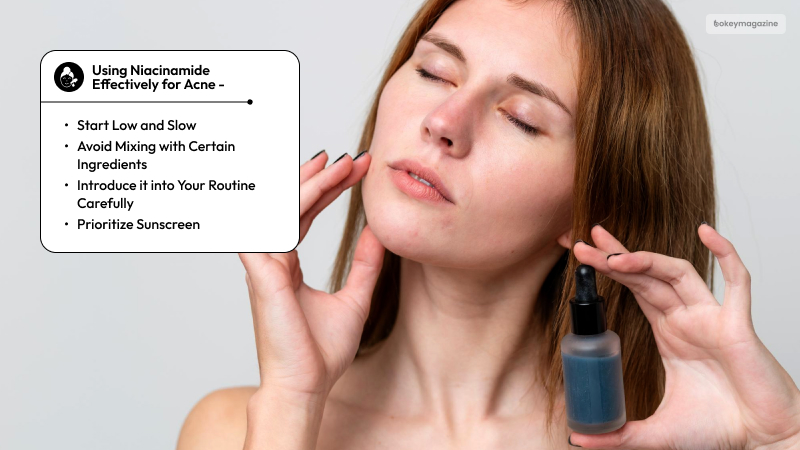
To get the most out of niacinamide for your acne-prone skin, consider these helpful tips:
- Start Low and Slow: Begin with a lower concentration of niacinamide (2-5%) and gradually increase the strength as your skin adjusts.
- Avoid Mixing with Certain Ingredients: Steer clear of using niacinamide alongside vitamin C, as the two can cancel out each other’s effects potentially.
- Introduce it into Your Routine Carefully: Incorporate niacinamide-containing products into your routine one at a time, allowing your skin to adapt before adding more.
- Prioritize Sunscreen: Niacinamide can make your skin more sensitive to UV rays, so be sure to use a broad-spectrum sunscreen daily.
Last but not least, be patient; acne can be a stubborn condition, and it may take several weeks or even months to see the full benefits of niacinamide. Stick with it, and don’t get discouraged.
Is It Okay to Use Niacinamide for Acne Skin?
After delving into the science, potential benefits, and proper usage of niacinamide for acne, it’s clear that this versatile ingredient can indeed be a game-changer for many people struggling with this persistent skin condition.
Niacinamide’s ability to regulate sebum production, reduce inflammation, and strengthen the skin’s barrier makes it a powerful ally in the fight against acne. And with its additional benefits for hyperpigmentation, aging, and overall skin health, it’s no wonder that niacinamide has become a skincare superstar.
If you’re ready to take the next step in your acne-fighting journey, consider incorporating a niacinamide-based product into your routine. Start slow, be patient, and don’t hesitate to consult a dermatologist if you have any concerns. Your clearer, healthier-looking skin may be just a few weeks away!
You May Also Like To Read:



















Post Your Comment